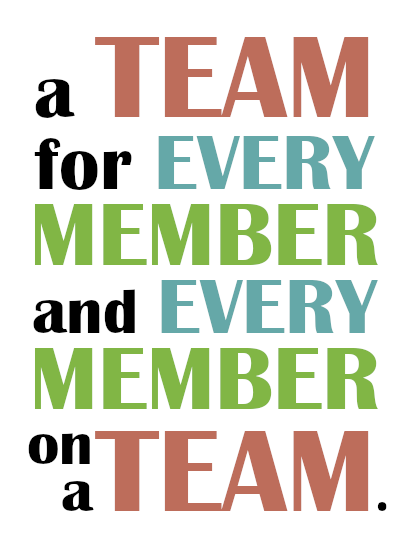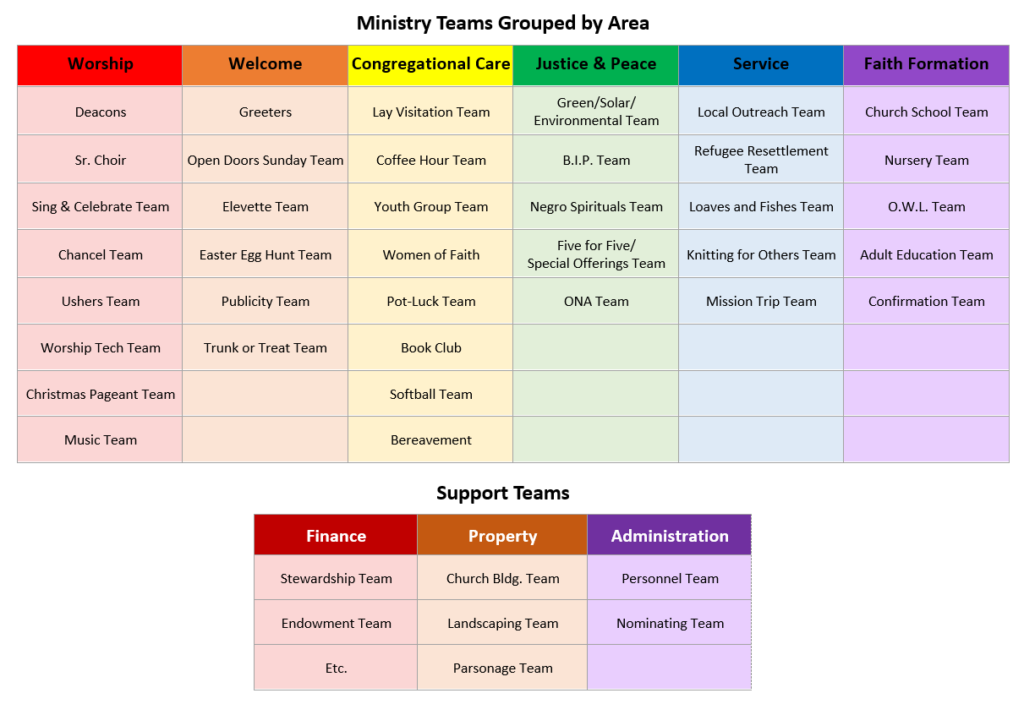by Rev. Dr. Dale Azevedo, Sr. Minister
Last October, we approved our new church structure in principle. This Sunday we will be voting on our new by-laws and (hopefully) moving to our new structure in practice. This will be a fluid transition that we hope will lead to ministries that are more flexible, relevant, and meaningful.
One of the hallmarks of the new structure is its reliance on ministry teams. Although we have called our ministry groups “teams” for a decade now, they have been, for all intents and purposes, “committees”; meaning their membership has been elected and their function prescribed by others. In a true team-based ministry model, teams are comprised of volunteers who coalesce around a common passion for a particular ministry. Teams are far more fluid and dynamic, beginning and ending based upon the passions of membership and the needs of our community.
Of course, in order for this model to succeed it requires passionate people. People need to be committed to a ministry for it to continue. In the old model people might remain on a team out of guilt or a sense of responsibility. In the new model they participate because they really want to! They realize that they get something out of what they are doing and they enjoy being a part of it.
This invariably raises the question, “but what if no one wants to do xxx?” Well, then the answer is that we don’t do that ministry.  Frankly, if no one wants to participate in a particular ministry, then why are we wasting precious energy trying to make it happen? Now there are some ministries that we simply must do, like taking care of our buildings, managing our assets, and overseeing our personnel. But there are many legacy ministries that just stick around churches either because we have always done that or because someone else thinks it’s important. But if someone thinks is important, then they ought to care enough to help out and make it happen!
Frankly, if no one wants to participate in a particular ministry, then why are we wasting precious energy trying to make it happen? Now there are some ministries that we simply must do, like taking care of our buildings, managing our assets, and overseeing our personnel. But there are many legacy ministries that just stick around churches either because we have always done that or because someone else thinks it’s important. But if someone thinks is important, then they ought to care enough to help out and make it happen!
So the big trick becomes discovering the passions within our membership, identifying the needs of our community, and empowering people to bring these two items together.
This is why I have come up with the slogan: A team for every member and every member on a team.
This is heart of the new structure. In the past teams have been hard to fill because they required people to make a three year commitment, attend monthly meetings, and engage in projects they may not care about. In contrast, most true ministry teams are narrowly focused, meet as they need to, and are inspired by people’s interests.
Here is a chart of all the different teams we expect to start off with categorized according to our mission statement (which is also reflected in the new structure):

(Click here to enlarge)
And this is just the start! New teams can be formed at any time. We have a process in place that can help anyone in the church start up a new ministry if they feel called.
My hope is that every member of the church will be a part of a team. With so many ministries to choose from and so many of them tailored to particular interests, I hope everyone can find a team that speaks to them, fits within their unique schedule, and makes a difference in the church, community, or world. Wouldn’t that be amazing?!?
 Eventually, hopefully pretty soon, we will have all of these teams listed on the website with information about them and contact information on how to join or help out. That will be a bit of an undertaking to make happen, but it will happen. In the meantime, if you are interested in a team and do not know who to contact you can call the church and someone in the office will be able to point you in the right direction, myself included.
Eventually, hopefully pretty soon, we will have all of these teams listed on the website with information about them and contact information on how to join or help out. That will be a bit of an undertaking to make happen, but it will happen. In the meantime, if you are interested in a team and do not know who to contact you can call the church and someone in the office will be able to point you in the right direction, myself included.
Teams are the heart and soul of the planned new structure. They are the membership of the church. They are where the ministry happens. They are how people get involved and where real change happens. And they cannot exist without you. What would you like to get involved in? How would you like to be a meaningful part of your church? Once you find the answer, let’s talk and we’ll get you involved!



